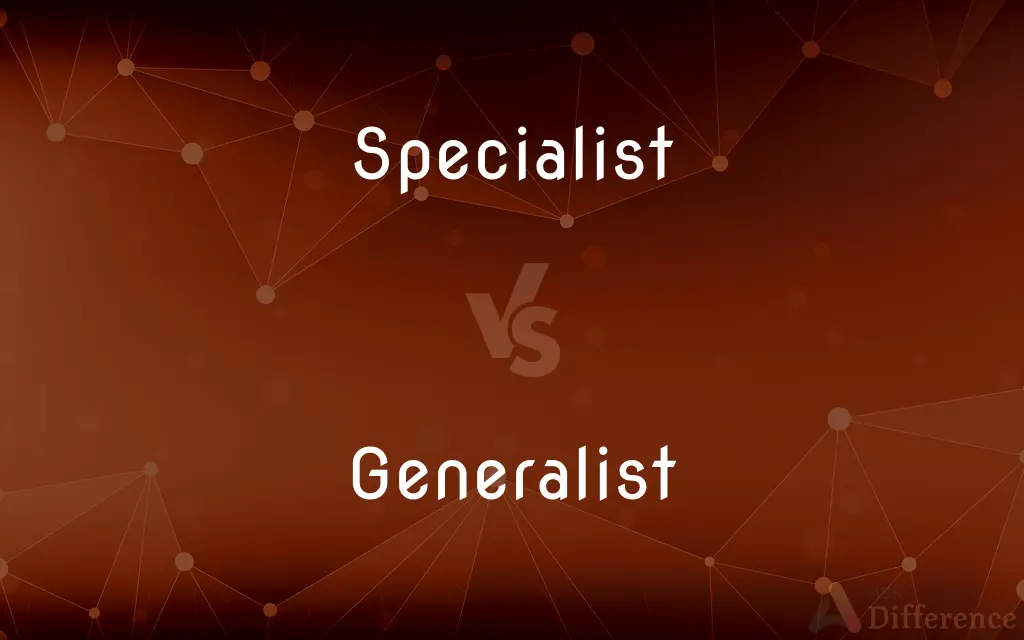Specialist vs. Generalist — What's the Difference?
By Fiza Rafique & Urooj Arif — Updated on April 18, 2024
Specialists focus deeply on one field, gaining expert knowledge, while generalists possess broader skills across multiple areas.

Difference Between Specialist and Generalist
Table of Contents
ADVERTISEMENT
Key Differences
A specialist dedicates their career to mastering a specific discipline or skill, which often involves extensive training and education. On the other hand, a generalist has knowledge and skills in a variety of fields, making them adaptable in diverse roles.
Specialists are highly valued in fields where deep technical expertise or advanced knowledge is crucial, such as medicine or engineering. Whereas generalists excel in roles that require versatility and the ability to handle multiple tasks simultaneously, like project management or consulting.
In the job market, specialists may find it easier to stand out in niche areas, often commanding higher salaries due to their rare expertise. Conversely, generalists can transition more easily between different job roles and sectors, providing them with broader career options.
In terms of problem-solving, specialists bring depth and detail-oriented solutions to specific issues. In contrast, generalists often approach problems with a wide-ranging perspective, making them effective in strategic roles that require holistic thinking.
Collaboration in work environments can benefit from both specialists, who provide deep insights, and generalists, who contribute broader viewpoints and coordination skills. This diversity often enhances team dynamics and problem-solving capabilities.
ADVERTISEMENT
Comparison Chart
Focus
Deep, narrow expertise
Broad, versatile knowledge
Education/Training
Extensive in a specific field
Wide-ranging across many fields
Job Market Appeal
High in niche areas
Broad appeal across various sectors
Problem Solving
Detailed, in-depth solutions
Holistic, strategic solutions
Career Flexibility
Lower due to specialized focus
Higher due to adaptable skills
Compare with Definitions
Specialist
In the workforce, a person whose job is highly specific.
She works as a cybersecurity specialist.
Generalist
Someone whose skills are not limited to one narrow area.
Her generalist approach makes her an excellent project manager.
Specialist
A professional who focuses on a particular branch of their field.
She became a specialist in marine biology.
Generalist
A person with knowledge of many different fields.
As a generalist, he can manage multiple aspects of the business.
Specialist
A person who concentrates primarily on a specific subject or activity.
A cardiologist is a specialist in heart health.
Generalist
In human resources, a staff member who deals with various aspects of employee relations.
The HR generalist handles both recruitment and training.
Specialist
Someone regarded as an expert because of their in-depth knowledge.
He is a specialist in 18th-century French literature.
Generalist
A business strategy focused on a wide range of products or services.
Their generalist strategy has captured a large market share.
Specialist
A product or service that is designed for a particular purpose or group.
This software is a specialist tool for architects.
Generalist
An animal or plant adaptable to various environments.
Raccoons are generalists that thrive in both rural and urban areas.
Specialist
A person who concentrates primarily on a particular subject or activity; a person highly skilled in a specific and restricted field
The study was undertaken by a market-research specialist
He is a specialist in psychometric testing
Generalist
One who has broad general knowledge and skills in several areas.
Specialist
Possessing or involving detailed knowledge or study of a restricted topic
You may require specialist financial advice
Generalist
A species whose members are able to live in a wide variety of habitats or consume a wide variety of foods.
Specialist
One who is devoted to a particular occupation or branch of study or research
An antiquarian who is a specialist in 17th-century Dutch ceramics.
Generalist
A person with a broad general knowledge, especially one with more than superficial knowledge in several areas and the ability to combine ideas from diverse fields.
Specialist
A physician whose practice is limited to a particular branch of medicine or surgery, especially one who is certified by a board of physicians
A specialist in oncology.
Generalist
(medicine) A general practitioner.
Specialist
Any of several noncommissioned ranks in the US Army that correspond to that of corporal through sergeant first class.
Generalist
(ecology) Species which can thrive in a wide variety of environmental conditions. A eurytopic species.
Specialist
A species with narrow habitat or food requirements
Specialists that feed only on carrion.
Generalist
A modern scholar who is in a position to acquire more than superficial knowledge about many different interests;
A statistician has to be something of a generalist
Specialist
(British) Specialised, involving detailed knowledge of a restricted topic.
Specialist
Someone who is an expert in, or devoted to, some specific branch of study or research.
Specialist
(medicine) A physician whose practice is limited to a particular branch of medicine or surgery.
Specialist
Any of several non-commissioned ranks corresponding to that of corporal.
Specialist
An organism that is specialized for a particular environment.
The tree Lepidothamnus laxifolius is a high alpine specialist found in high-altitude bog communities and in scrub.
Specialist
A stenotopic species.
Specialist
One who devotes himself to some specialty; as, a medical specialist, one who devotes himself to diseases of particular parts of the body, as the eye, the ear, the nerves, etc.
Specialist
An expert who is devoted to one occupation or branch of learning
Specialist
Practices one branch of medicine
Common Curiosities
What is a specialist?
A specialist is someone deeply focused on a particular discipline or field, often with extensive knowledge and skills.
How do specialists and generalists differ in the workplace?
Specialists are often employed for their deep expertise in a specific area, while generalists are valued for their versatility and ability to manage multiple tasks.
Is it better to be a specialist or a generalist?
The choice between being a specialist or a generalist depends on personal career goals and the demands of the job market. Both have unique advantages and opportunities.
What is a generalist?
A generalist possesses a broad range of knowledge and skills across various disciplines, often adaptable to different roles.
In what fields are specialists particularly important?
Fields like medicine, science, and technology often require specialists due to the complex knowledge and skills needed.
Can a specialist become a generalist?
Yes, specialists can broaden their expertise and become generalists, although it may require additional training or experience in various fields.
How do hiring managers view specialists versus generalists?
Hiring managers might prefer specialists for roles requiring deep technical skills and generalists for positions needing broad oversight and versatility.
How do generalists handle changes in the job market?
Generalists are typically better equipped to adapt to changes in the job market, given their broad skill sets and versatility.
Are generalists or specialists better leaders?
Leadership can depend on many factors; generalists might excel in roles requiring broad oversight, while specialists may lead effectively in technical fields.
How do generalists and specialists solve problems differently?
Specialists often apply deep, technical analysis to problems, whereas generalists might use a more integrated approach involving various fields of knowledge.
What are the educational paths for specialists and generalists?
Specialists often pursue highly focused educational tracks, while generalists may study more diverse subjects or multiple disciplines.
What are the salary differences between specialists and generalists?
Specialists can often command higher salaries in their niche fields, while generalists' salaries may vary widely based on their roles and industries.
Which type of professional is more likely to start their own business?
Generalists, with their broad knowledge and adaptable skills, are often more likely to start diverse types of businesses.
What is an example of a generalist role in technology companies?
In technology companies, a generalist role might include positions like project manager or product manager, where knowledge of multiple tech aspects is beneficial.
How do specialists contribute to innovation?
Specialists contribute to innovation by developing new techniques, technologies, and methods within their specific fields.
Share Your Discovery

Previous Comparison
Granite vs. Gravel
Next Comparison
Colloid vs. SuspensionAuthor Spotlight
Written by
Fiza RafiqueFiza Rafique is a skilled content writer at AskDifference.com, where she meticulously refines and enhances written pieces. Drawing from her vast editorial expertise, Fiza ensures clarity, accuracy, and precision in every article. Passionate about language, she continually seeks to elevate the quality of content for readers worldwide.
Co-written by
Urooj ArifUrooj is a skilled content writer at Ask Difference, known for her exceptional ability to simplify complex topics into engaging and informative content. With a passion for research and a flair for clear, concise writing, she consistently delivers articles that resonate with our diverse audience.
















































